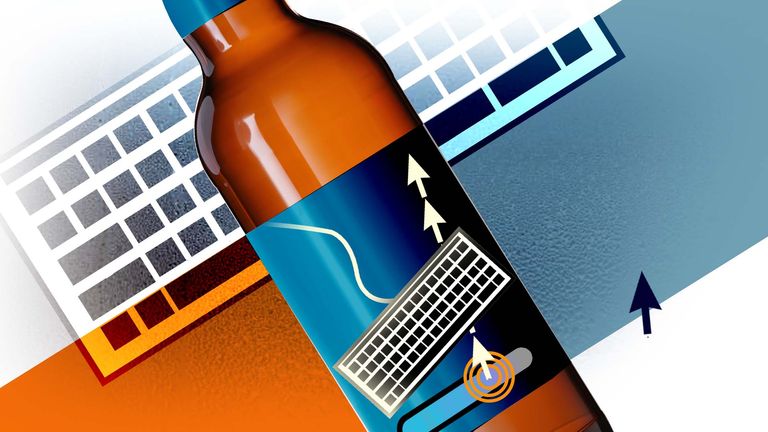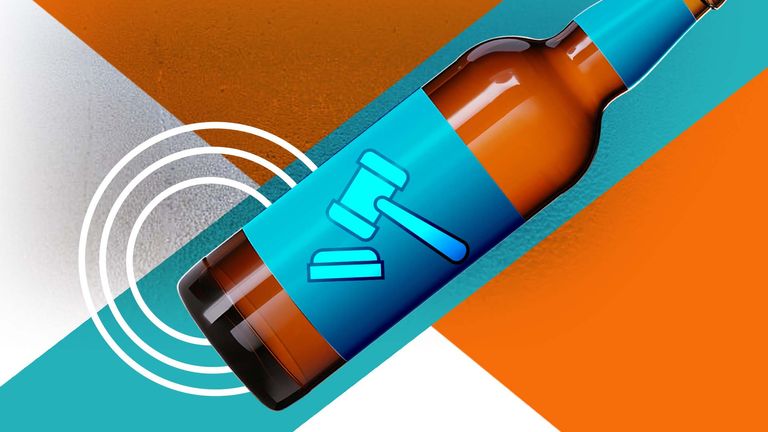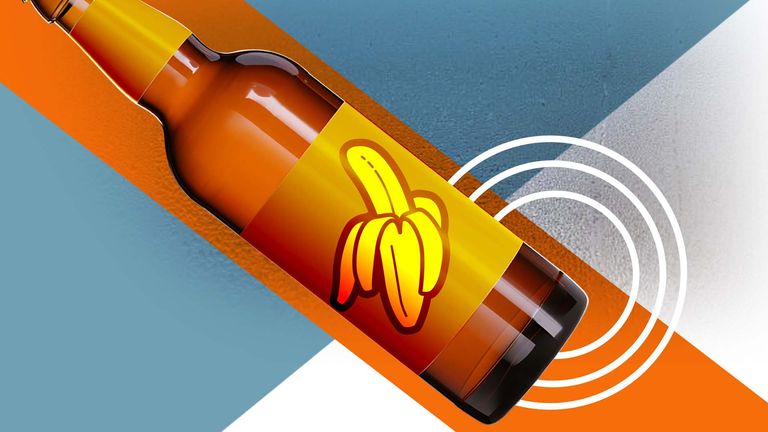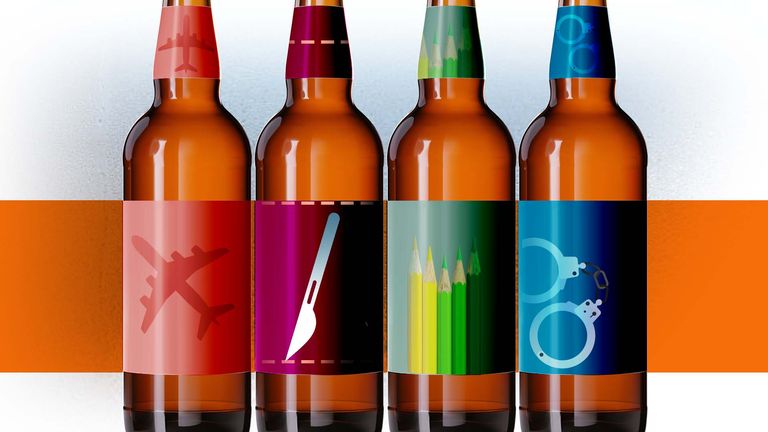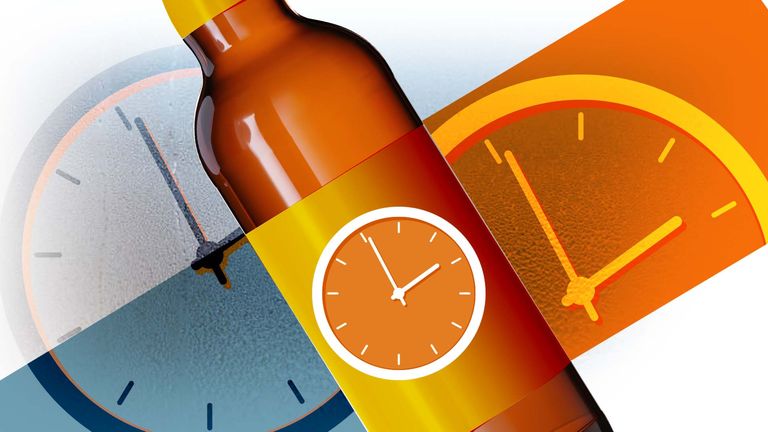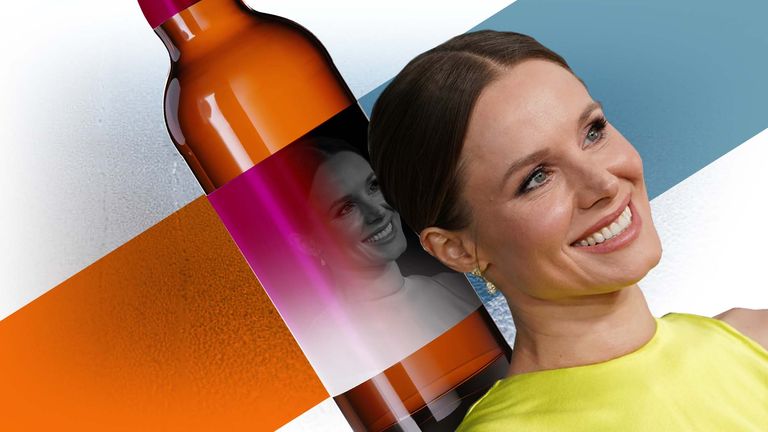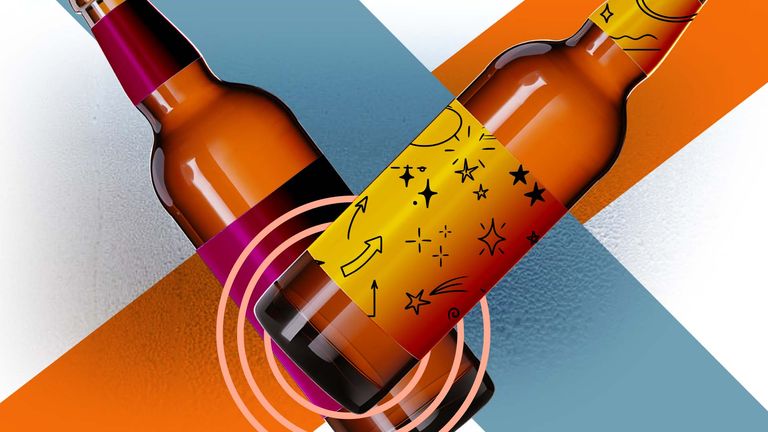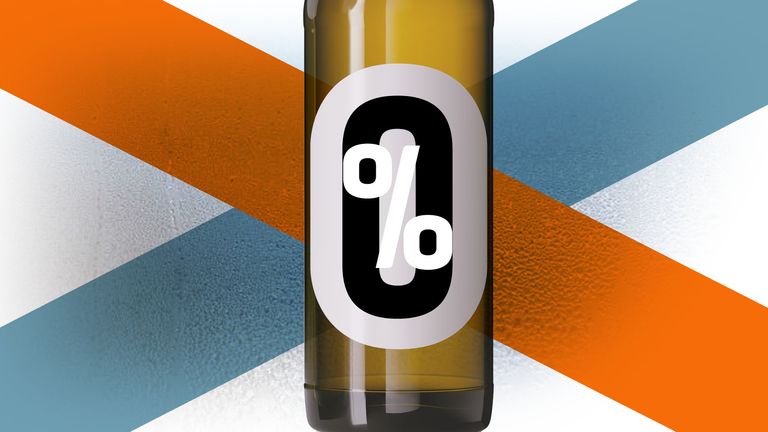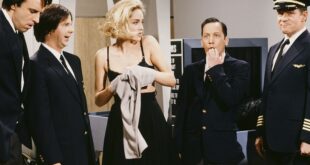
You’re sitting at your desk in the office, tapping away at your laptop, you hear the unmistakable sound of a can being cracked open by your colleague sitting next to you.
But rather than an ice-cold coke or gut-friendly kombucha, they’re sipping a beer. On closer inspection you see it’s alcohol-free, but it’s a hoppy, malty beer nonetheless.
Fine if you work in a brewery perhaps, or an office with a ping-pong table and Beer Fridge Fridays, but this is credit control. It’s a Tuesday. It’s 10.30am. Is this weird? Is your boss going to have a word?
What if you work in a school? Or a hospital? Behind the controls of a Boeing 747? Could you sip a can of Guinness 0.0 while leading that important presentation to the big bosses from the sixth-floor corporate strategy business mergers division?
Debate in the office at Sky News HQ was sparked by recent comments by Frozen and Veronica Mars star Kristen Bell, who revealed she allows her daughters, aged 8 and 9, to drink non-alcoholic beer. Conversation about whether or not this is appropriate – let’s come to this later – opened up discussion on other scenarios that might get you cancelled, sacked, arrested, or frowned upon at the very least.
It’s an issue that some workplaces may have to consider. As more and more people look at ways to cut down on their drinking, the no-alcohol and low-alcohol drinks market is booming.
Analysis of “key markets”, including the UK and US, by International Wine and Spirit Research found the market value of no/low alcohol products in 2022 surpassed $11bn (about £8.64bn), up from $8bn (about £6.9bn) in 2018. Sales of products such as no or low-alcohol beer, cider, wine, spirits have doubled in the UK in the last five years, according to the charity Drinkaware.
Alcohol-free alternatives are growing in popularity in the pub, at dinner, and other social settings outside the 9-to-5. So whether it’s a glass of milk or a pint of beer, if there’s not enough alcohol to get us drunk – what’s stopping us at work?
Here’s what the legal experts say
“Consuming a non-alcoholic drink in the workplace is not illegal,” says Andrew Willis, associate director of legal at employment law specialists Croner. “As to whether it is acceptable or not will ultimately depend upon the stance of the company.”
The issue is similar to that of vaping, he points out, with the rise in people using the cigarette alternative leading many employers to update policies.
“If employers do allow non-alcoholic drinks in the workplace, they will need to consider how they will monitor what their employees are drinking given how alike the bottles or cans look to drinks containing alcohol,” he continues. “Many employers may decide it is a problem they could just do without and so decide to deem it unacceptable.”
With the rise in popularity of alcohol-free alternatives, employers are “waking up” to the fact they may need rules in place, says Melanie Stancliffe, a partner and employment law specialist at legal firm Cripps.
“If you’re counter staff at a high street bank and instead of having your coffee cup or your glass of water you have a non-alcoholic beer on show, I think it would have different perceptions – but the law wouldn’t necessarily be different,” she says. “Any employer has to be very clear on the expectation in the policies that set out what is allowed.”
Boozy bananas? The alcohol in your everyday snacks
Government recommendations in England say alcohol-free beverages may contain up to 0.05% ABV (alcohol by volume) – so a 500ml can of a 0.05% ABV drink would contain 0.025ml of alcohol, which is one fortieth of a unit of alcohol.
However, as this is voluntary guidance rather than law, some labelled as alcohol-free can contain up to 0.5% ABV – so a 500ml can would contain a quarter of a unit. For context, many everyday food and drink items contain small volumes of alcohol – bread, fruit juice, yoghurt, healthy kombucha, even bananas – some more than alcohol-free beers.
“Alcohol can naturally form in foods as sugars break down to form ethanol,” says Dr Duane Mellor, a dietician at Aston University in Birmingham. “This can occur in foods like bananas as they ripen, but only very low levels around 0.5% will form. Alcohol will naturally also form during proving as part of breadmaking, as yeast works on the starch in flour to produce alcohol; although most of this evaporates during baking, in some breads moderate levels can be left behind.”
Pilots, surgeons, teachers, police – what are the rules?
It’s all about perception, it seems. No one’s going to complain about you quaffing an orange juice on the job – but while it might legally be okay to drink an alcohol-free beer or wine while on duty, in certain situations it probably wouldn’t go down well.
The pilot taking you on your summer holiday, for example, is not allowed to fly when under the influence of drugs or alcohol, according to Civil Aviation Authority (CAA) rules, and there are further restrictions regarding consumption prior to duty.
In terms of alcohol-free drinks, there is no CAA ruling, but airlines may have their own policies to avoid misperception.
Having an operation? How would you feel about the surgeon sipping a can of alcohol-free beer during the procedure? Most hospitals prohibit food consumption of any kind in theatres, due to risk of contamination. Alcohol is banned, but water and some other fluids are allowed.
If you work in the NHS, it would be considered inappropriate to drink non-alcoholic beers, wines or spirits while on duty, as staff are expected to act professionally and uphold standards. But again, it seems there is no UK-wide ruling. And if it’s not going to get you drunk, why do we feel like this?
Sky News contacted a range of individual airlines and police forces, government departments and governing bodies, from the General Medical Council (GMC) to the National Police Chiefs’ Council to the Department of Education. Teachers, for example, are expected to maintain high standards of personal and professional conduct, in and outside of school – but does drinking a non-alcoholic drink count as unprofessional?
‘It’s associated with socialising or winding down’
For those worrying about their next hospital visit, be reassured; whether there are official rules in place or not, it seems healthcare workers police themselves.
“You sign up to a code of conduct,” one senior nurse told Sky News. “What would a patient turning up to A&E think? Even if there is no alcohol, it gives a bad impression. Some wards aren’t even allowed drinks like cups of tea due to infection control. Sometimes we might celebrate a New Year shift with [sparkling grape juice drink] Schloer – a patient got married on the ward once and we had Schloer then, too. Could I see a day when it might be “no-secco”? I suppose it’s possible. But only on those kinds of occasions.”
“It’s associated with socialising or winding down,” said another senior nurse. “It’s just not professional when in the workplace, especially in a hospital.”
Dr Nicholas Peat, a GP and co-founder of nutrition and lifestyle company UniquelyCreatedU, says there is no rule about the consumption of non-alcoholic drinks in front of patients, but it is a GP’s responsibility to act professionally. “I would not be comfortable drinking these types of beverages in front of a patient. These drinks could be easily misunderstood as the real thing. Furthermore, drinking while consulting can be distracting, and risks altering the flow of communication.”
‘There’s a time and a place’
For parents, the general consensus is that they wouldn’t be happy seeing teachers drinking alcohol-free beverages at school.
“The fact the drinks contain zero or very little alcohol is irrelevant,” said Hannah Doyle, an author and mum of twin boys at primary school in Sheffield. “To me it’s more about the message it sends… I think it would be confusing to children of all ages, particularly as low- or no-alcohol brands are designed to look just like their alcoholic counterparts. You won’t catch me swigging back a glass of alcohol-free red wine while I’m dishing out their breakfast just because it’s not boozy. For me, there’s a time and a place.”
Gareth Nye, a doctor and father of three, agreed. “It comes down to setting the right appearance to children who are growing and developing. Being responsible with how we set ourselves in front of children of all ages is crucial – teachers are still role models.”
What did Kristen Bell say?
The UK charity Drinkaware, which offers advice on alcohol consumption and how to cut down or stop, recommends swapping alcoholic drinks for low or no-alcohol alternatives for those looking to reduce intake. However, the guidance is to stick to thinking of them as an alternative – rather than introducing them into situations when you would not be drinking anyway.
“The general principle is to avoid them when you would also avoid drinking alcohol, for example when you are pregnant or while you are driving,” says chief executive Karen Tyrell. “They are also designed for adults and not suitable for children.”
Which brings us to Bell’s comments. During an appearance on The Kelly Clarkson Show, the actress said her young daughters had tried alcohol-free beer in the past. “You can judge me if you want, I’m not doing anything wrong,” she said.
During childhood and teenage years, the brain and body are still developing, so alcohol – even small amounts – can affect memory function, reactions, learning ability and attention span. But if the beer is alcohol-free, like Bell says: what’s the problem?
Well, not everyone was outraged; several parents who spoke to Sky News said they would also be open to using the drink for teaching their children.
Nick Sorrell, from Stoke on Trent, says he takes the same approach with his 13-year-old son that his father did with him. “He never kept alcohol a mystery. If I asked what a particular drink tasted or smelled like, I’d have the opportunity to sniff and maybe taste it as a young teenager.
“I feel it gave me an appreciation of what the drink was, so I was less likely to bow to peer pressure and drink nasty cheap cider in the park. My son has sampled some small sips of alcohol-free beer and wine, with sensible conversation about what alcohol does to people, and why I choose to consume more alcohol-free adult drinks than I do alcoholic.”
While Drinkaware advises against alcohol-free alternatives for children and for mums-to-be, pregnancy charity Tommy’s – which is guided by NHS advice – says they are safe for expectant mums as long as they are truly alcohol-free, so only up to 0.05%.
“If it is an occasion, they can make a great alternative to soft drinks that you might have every day,” the charity says. “Be aware that some drinks that claim to be ‘non-alcoholic’ can contain tiny amounts of alcohol so always check the label.”
Can there be a placebo effect?
According to experts, some people may experience a placebo effect when consuming non-alcoholic drinks – so while they’re not actually drunk, they might feel like they are.
Dr Cathy Montgomery, a reader in psychopharmacology at Liverpool John Moores University’s School of Psychology, says a certain taste or the look of an alcoholic drink might be associated with previous feelings of drunkenness, so “when someone with experience of drinking alcohol switches to a zero-alcohol drink, which is designed to be similar… in look and taste, the expectancy of alcohol’s effects from our previous experiences can cause us to feel tipsy”.
Nottingham Trent University psychology professor Thom Baguley says the placebo effect is “deeply misunderstood” – including by many experts – and that it is important to consider the social setting; people behave differently even when drinking alcoholic drinks depending on whether they are alone or in a group, drinking at home or in a “stimulating” environment such as a pub.
“People aren’t that good at disentangling multiple influences on their behaviour so it seems most likely that people are attributing other influences to what they drink rather than the drink itself having an effect per se.”
So… will a low-alcohol drink get you drunk?
Janey Lee Grace, who founded The Sober Club, believes that in situations where you would be able to drink a soft drink, alcohol-free alternatives should be allowed.
“I think most people would probably think twice before popping a cork on a bottle of 0% fizz at 11am when colleagues are drinking cola, but that’s just psychological,” she said. “Alcohol-free fizz isn’t intoxicating or addictive – they’re just ‘grown up’ soft drinks, so there is no difference to drinking cola – just less sugar.”
And brewing experts say they are safe.
Rod White, a master brewer and assistant professor at the International Centre for Brewing Science at the University of Nottingham, says alcohol-free beer will not have any impact – and even drinking low-alcohol beer of up to 1.5% is unlikely to get you drunk.
Take a low-alcohol 1.5% beer and a typical 4.5% beer – while you might think it would simply take three times as much of the low-alcohol beer to reach the drink-drive limit, he says research suggests this is not the case.
“I’m fairly sure that drinking 1.5% you would find it difficult, and that’s tested on people drinking over 10 pints,” he said. “It’s because with so much water coming in with the low level of alcohol, you break it down. There is more research required, and I am not a medical expert, but it’s likely to be very, very difficult, if not impossible – although I’m not suggesting people should try drinking that much and driving.”
Whatever the industry, there is technically no reason not to allow employees to drink alcohol-free alternatives, he said.
“Beer is actually very good for you, if you take the alcohol out. It contains things like soluble fibre, vitamins and minerals. It’s far healthier than a can of coke, because it’s all natural sugars.”
But is society ready to think of alcohol alternatives as general daytime drinks?
“It’s become acceptable in the pub as an alternative,” said Rod. “But in an office for example – I don’t think people could quite get their heads around it.”

 Latest Breaking News Online News Portal
Latest Breaking News Online News Portal

